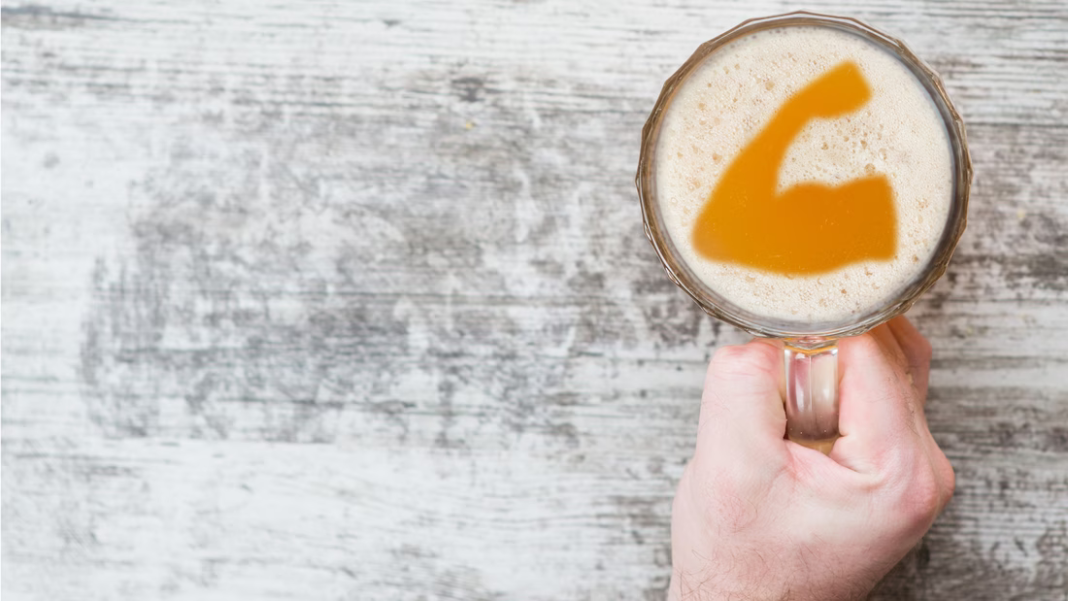What Influence Does Alcohol Have on Muscle Building and How Long Should You Avoid It After Training?
Do you think you deserve a beer after exercise? Not a good idea if you train ambitiously. Because alcohol has harmful effects on muscle building. In order to understand the influence that alcohol has on muscle building, you should first briefly understand how muscle building works in your body:
Muscle Building Process: Muscles do not grow through cell division, but rather through thickening of their muscle fibers. In order for them to increase in volume, the muscle fibers have to be stressed above average, so that small muscle fiber tears occur. During the regeneration phase, the body reacts to this with repair processes: to put it simply, it produces more proteins that accumulate around the injuries in order to repair them. And in order to be better prepared against muscular challenges in the future, more proteins are incorporated there than are necessary for pure repair, with the result that the muscle size increases. To achieve this, several factors must come together: These include sufficiently high growth stimuli during training, optimal rest phases and a healthy, nutrient-rich diet.
Effects of Alcohol on Muscle Building: What effects does alcohol have on building muscle? Anyone who drinks alcohol after strength training hinders the numerous metabolic processes that are crucial for the repair processes and the building of more muscle mass.
Inhibited Protein Synthesis: Alcohol affects the production of the stress hormone cortisol. Just 0.4 grams of alcohol per kilogram of body weight increases the production of cortisol for at least the first four hours after consumption. Since cortisol is an antagonist of the growth hormone testosterone, this is produced in smaller quantities by alcohol, so that less muscle protein can be synthesized and consequently the increase in muscle mass is lower. In a study examining the effects of alcohol consumption in physically active men, a significant reduction in muscle protein synthesis (37%) was found when 1.5 g/kg of alcohol was consumed post-exercise.
By the way, the increased cortisol released can also lead to increased fat storage in the body – making it harder to see the hard-earned muscles.
Rising Blood Sugar Levels: Alcohol influences blood sugar levels via cortisol by causing a greater breakdown of proteins and thus the release of glucose. Less glucose from the liver is then available for the next training session. At the same time, glycogen synthesis in muscles and liver is inhibited by alcohol: a British study showed a reduction of 50 percent in the first eight hours after training and by 16 percent in the first 24 hours. The result can be cravings.
Weaker Nutrient Absorption: Alcohol removes water from the body. This is again due to the increased cortisol released by alcohol: it causes sodium to be retained in the body and subsequently stored in the spaces between the cells in the body. The supply of nutrients and minerals to the cells necessary for muscle building is hindered, and the body is less able to absorb the necessary vitamins and minerals, such as calcium, magnesium and iron.
And that’s not all: “In extreme cases, this can also lead to dangerous arrhythmias in the heart muscle,” warns Prof. Dr. med. Heidrun Thaiss, head of the Federal Center for Health Education (BZgA) in the Alcohol Levels newsletter.
Lack of Regeneration: It’s not just the beer or schnapps immediately after training that influences your training success. Because muscles grow in the regeneration phases between two training sessions. If you drink alcohol between 2 training days, it can extend the regeneration time or make it less effective. Instead of “repairing” the muscle fibers and thereby making them grow, your body is busy breaking down alcohol.
Alcohol is metabolized with the help of enzymes in the liver, and for this the organ requires energy, which is then no longer available for muscle regeneration and muscle building. However, breaking down the cell toxin ethanol is always a priority for your body.
The success of your next training session will also be less. Because if the regeneration phase between two training sessions is less productive, e.g. due to alcohol or poor sleep, a typical consequence of alcohol consumption, you will not be able to put maximum strain on your muscles during the next training session – and thus slow down the overall build-up of more muscle mass.
This is also proven by a smaller study published in Sports Medicine : Scientists had 11 men complete maximum thigh training. Some of the men then drank 1 g per kilo of body weight of ethanol in the form of vodka with orange juice, the other men drank orange juice without alcohol. The test subjects repeated their training after 36 and 60 hours. Due to the short recovery time, all participants performed worse. But the performance of those who had consumed alcohol in between was significantly worse than that of the no-alcohol group.
How Much Alcohol Is Okay During Muscle Building Phases? If you take your training seriously and are training for muscle gain, it’s best to avoid alcohol for the first 60 hours after resistance training. You should at least give your body this time to do regeneration work.
But you should also avoid alcohol 24 hours before training if possible, as alcohol affects your motor skills and ability to react and increases the risk of injury. In addition, the performance of muscles decreases when they are dehydrated, and alcohol removes water from the body.
In order not to let the breaks between two training sessions become too long, you should plan the intervals well. If you have a party on the weekend, make sure your training is spaced out appropriately. Alcohol should be planned once a week.
You don’t have to be completely abstinent, but keep your alcohol consumption in moderation. The DGE recommends: Men should consume a maximum of 20 grams of alcohol per day (women: 10 grams/0.3 liters of beer or half a glass of wine), i.e. no more than about half a liter of beer or 0.25 liters of wine, and on 2 Avoid it completely for days. If you are unsure about your alcohol consumption, get advice, for example on the BZgA page know-your-limit .
It would be best if you switched to non-alcoholic drinks. There is now a large and good-tasting selection. Non-alcoholic beer is also refreshing and provides you with numerous nutrients and electrolytes that your hard-working body can use well.

